Difference Between Trademark and Copyright
Often our clients want clarification regarding the differences between copyright and trademark. While both represent intellectual property, the property each protects are substantially different.
Copyright and Trademark Definitions
Trademark: Any name, symbol, figure, letter, word, or mark adopted and used by any entity that sells goods or services to distinguish its products or services from the ones manufactured or sold by other third parties. For example, “Nike” and “Just Do It” are trademarks of Nike, Inc. in that they identify the source of the goods Nike sells in commerce.

Copyright: Exclusive ownership of and the right to make use of, for a limited period of time, artistic works that are fixed in a tangible medium. For example, J.K. Rowling owns the copyright in her Harry Potter books as author of the series.
Length of Time for Protection
One difference between a trademark and a copyright is the length of time in which each has an enforceable exclusive right. Copyrights are enforceable for the life of the author plus 70 years. Whereas, trademarks are enforceable indefinitely so long as the mark continues to be in use.
Unique Source Identifier
A trademark provides a unique symbol, figure, word, etc. which in the mind of the consumer is tied to a specific business. Whereas, copyright is not meant to necessarily identify any particular business. Copyrights are merely artistic works of authorship, which cannot be copied, distributed, or the basis of a new work (derivatives).
Can a Copyright be a Trademark?
Yes. Logos that have some artistic elements may be protected by copyright as well. However, business names without any design element are not eligible for copyright protection.
You can see the US Copyright Office’s simple explanation of the differences between patents, copyrights, and trademarks by clicking here.